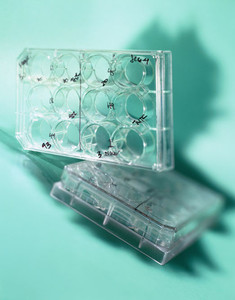A biosimilar recombinant human granulocyte colony-stimulating factor (filgrastim) (rhG-CSF), Zarzio (Sandoz GmbH), was evaluated in healthy volunteers in four phase I studies and in neutropenic patients in a phase III study.
Phase III study of a new biosimilar filgrastim product (Zarzio) published
Biosimilars/Research
|
Posted 04/06/2010
 0
Post your comment
0
Post your comment

The phase III open study enrolled 170 chemically naive, female, breast cancer patients, who received Zarzio (Sandoz GmbH), at a dose of 300 mg or 480 mg administered via the SC route. Patients were undergoing four cycles of doxorubicin and docetaxel (Taxotere) chemotherapy, and were therefore at high risk for severe neutropenia (low white blood cell count in the blood causing reduced host defence).
Efficacy
The mean duration of severe neutropenia with Zarzio was 1.8 days in cycle 1, compared to (historically) up to 7 days without growth factor. Over the four cycles, this was comparable (or lower) than historical data with the reference product, Neupogen (Amgen GmbH).
The incidence of febrile neutropenia in cycle 1 was 7.6% compared with 17.5% without growth factor. This also compared well with the reference product.
In clinical practice filgrastim is provided as pre-filled syringes of 300 mg or 480 mg. The corresponding individual doses therefore ranged from 3.7mg/kg to 8.4 mg/kg. Analysis of the effects in patients stratified by dose per kg body weight demonstrated similar therapeutic efficacy.
Safety
Zarzio was well tolerated in cancer patients. The overall incidence of adverse events was within the range of the reference product. Transient reversible increases in aspartate aminotransferase and lactate dehydrogenase were in the range of those previously reported with rhG‑CSF.
Analysis of the effects in patients stratified by dose per kg body weight also demonstrated a comparable safety profile for all dose groups.
Immunogenicity
Development of antidrug antibodies is of major concern during safety assessment of biopharmaceuticals. In clinical studies using Neupogen an incidence rate of 3% (11 patients out of 333) of non-neutralising antibodies has been reported. In the phase I studies and the phase III study of Zarzio none of the 316 subjects developed anti-rhG-CSF antibodies.
This study confirmed that the administration of Zarzio was efficacious and safe, triggering no immunogenicity.
(link to Development of a new biosimilar filgrastim product (Zarzio) and Phase I studies of a new biosimilar filgrastim product (Zarzio) published)
Reference:
Gascon P, Fuhr U, Sorgel F et al. Development of a new G-CSF product based on biosimilarity assessment. Ann Oncol. 2009 Dec 17. doi: 10.1093/annonc/mdp574
News
FDA approves Poherdy (first interchangeable pertuzumab) and Armlupeg (pegfilgrastim) biosimilars
EMA recommends approval for insulin glargine biosimilar Ondibta and denosumab biosimilar Osqay
General
Samsung Bioepis wins Pyzchiva case; Regeneron patent rulings threaten foreign biosimilars
Chinese biosimilars go global: growth, partnerships, and challenges
What is the future for the US biosimilar interchangeability designation

Biosimilars/Research Posted 05/06/2025
Biosimilar clinical efficacy studies: are they still necessary?

Biosimilars/Research Posted 27/05/2025
The best selling biotechnology drugs of 2008: the next biosimilars targets








Post your comment